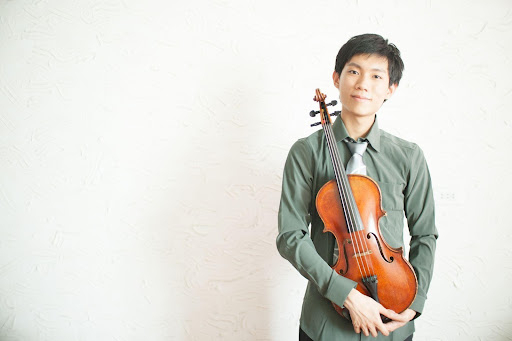
Artists aim to impact the world through their chosen medium, whether music or visual art. They aim to create a lasting impression, using their distinct perspectives and voices to captivate their audience. In classical music, the violin family holds an iconic status, and En-Chi Cheng is a name that stands out among the world's top viola players. Hailing from Taiwan, En-Chi has graced some of the world's most prestigious stages and earned a reputation as a boundary-pushing musician, reimagining classical music with his passion and excellence.
En-Chi's passion has led him to excel in school and professional playing fields. With many musical stages and shows under his belt, En-Chi's dedication to his craft was put to the test when he was chosen as one of the three soloists for the world premiere of James Ra's Concerto for Three Violas and Strings, commissioned by the New York Classical Players for its 10th anniversary in September 2021.
Taking on the challenge of contemporary music
Contemporary music has always posed unique challenges for musicians. Unlike the classical repertoire, where the notes and technical requirements are well-established, contemporary pieces require musicians to be adaptable, open-minded, and willing to take risks.
This is precisely what En-Chi experienced when he performed at James' Concerto. He explains that unlike learning a new piece by Mozart or Tchaikovsky, he had no idea what to expect when he received the music for the concerto months before the premiere. Being familiar with how experienced composers work, En-Chi knew the process would require the utmost attention to detail and perfection, even until the last minute.
En-Chi and James had a strong working relationship, with the composer communicating extensively with his musicians. They exchanged ideas and talked about details and insights into the music before the first rehearsal, which led to many musical revisions that allowed him to sharpen his communication skills.
En-Chi also shared that just before the first rehearsal, James asked the conductor and the musicians' permission for another rework of the piece. This time, he made the original three-movement structure into four, rearranging the themes and pace of the piece with an additional movement and some brand-new passages and musical elements. En-Chi remarked that these additions were among the most challenging music he had ever played.
The technical requirements of the piece were highly challenging, with virtuosic and beautiful solo viola lines that required him to jump between the highest and lowest registers of the instrument. Additionally, the concerto needed him to play in a particular tone color, different from his regular playing, to cut through the texture of the thick orchestra sound. Adding to the piece's difficulty was that the viola sound is more reflective and less showy than other instruments, making it challenging for solo violas to compete with the orchestra sound.
"It was difficult, but I wanted James' beautiful viola concerto to be played many more times after the premiere, which meant that the world premiere needed to be exceptionally good. So I put in hard work to learn everything, adjusted to things I was not accustomed to, and performed my best," En-Chi said.
Bringing a performance that resonates
Despite the technical challenges brought by James' Concerto, En-Chi was drawn to the piece because of its historical context. He noted that composers historically wrote for viola in the later stages of their lives, which meant that contemporary viola pieces are fascinating for violists. He understands that for a contemporary piece to survive in the repertoire list, it needs nods from both violists and audiences.
To achieve this, En-Chi spent meaningful time reading the content of the composition. "There are many layers of music performance: notes, rhythms, tempo, tone color, phrasings, expressions, intentions, and interpretations. I find learning a contemporary piece exciting in figuring out the elements," he said.
In the end, the premiere was a resounding success. "It was a joy to see many people, including myself, moved by this extraordinary music. I am sure it was an unforgettable experience for all – the team and the listeners," En-Chi shared.
The overall experience of performing for James' Concerto was unforgettable for En-Chi. It sharpened his existing skills and taught him new ones. The experience also enabled him to discover an approach for sparking innovation in his field, making classical music appealing and relevant to a new generation of concert-goers.
En-Chi Cheng: Success that empowers others
From his early exposure to viola back in Taiwan to his extensive training at Curtis Institute of Music in Philadelphia to different stages in the world, his passion for music has enabled him to overcome various challenges and continue on his professional journey.
His remarkable career as a violist has been marked by numerous achievements such as Best Opera Recording at the 63rd Grammy Awards, winning the Balmoral Prize at the XIII Tertis International Viola Competition in 2019, and many more that attest to his unparalleled dedication to his craft and innovative contributions to classical music.
Today, En-Chi embarks on a new mission: championing contemporary music and promoting emerging composers. Recognizing the challenges of introducing fresh compositions to audiences amid today's commission climate, he aims to advocate for contemporary music by consistently featuring it in concerts and recordings.
Together with his team at The New York Chamber Players (NYCP), an orchestral organization, they are dedicated to keeping the art of contemporary music by performing a new piece in every concert they present. "I joined NYCP not only because it fits my artistic vision but also its core value of presenting all concerts free of charge for the audience," En-Chi said.
He believes that through these initiatives, he is empowering fledgling musicians and composers to continue pursuing their dreams. "My contributions to projects like this allow composers in the early stages of their careers to gain valuable experience working with a professional conservatory-trained musician," he shared. His contributions to the field are further enriching the music community and enabling it to thrive for years to come.

